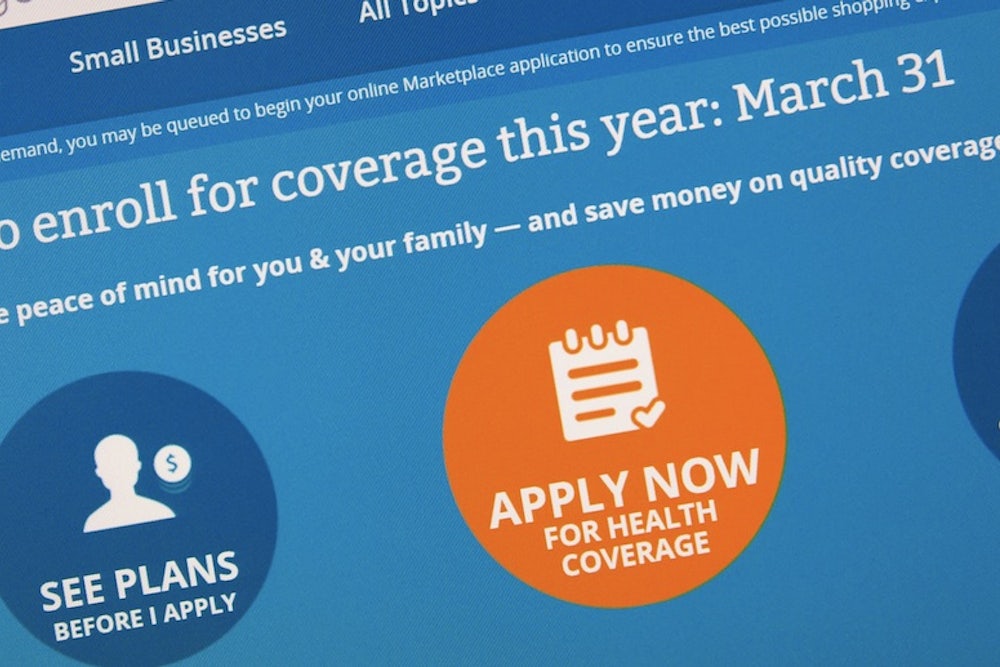There are still plenty of days when Obamacare looks bad. Tuesday wasn’t one of them.
The Department of Health and Human Services announced that more insurers were joining the Affordable Care Act's new marketplaces—you know, the places where people can buy coverage on their own and, depending on their incomes, qualify for subsidies. How many more insurers are participating? Quite a few, it turns out. According to HHS, the net increase is more than 25 percent. That should translate to more options for people buying coverage. The increased competition should also help keep premiums relatively low.
The data is preliminary, based on 44 states for which HHS had information. And of course the sheer number of insurers offering coverage is just one sign of how the law is doing. If you’re actually buying insurance, you don’t simply want choices. You want good choices. You want to know that the insurance will give you access to doctors and hospitals when you need them. You want to know that the coverage pays your bills adequately. And so on.
Still, Obamacare critics hadn’t predicted the markets would evolve this way. On the contrary, they expected that that young and healthy people would stay far away from the new marketplaces, because the new coverage would be pricier than what they were paying before. Without enough business, the argument went, insurers would get skittish and withdraw. At best, the marketplaces would all become oligopolies and monopolies, with just a handful of insurers continuing to sell policies. At worst, the whole scheme would fall apart. That quite obviously isn’t happening.
Trouble could still arise. By design, Obamacare includes a series of provisions designed to insulate insurers from major losses in the first three years. I usually describe them as “shock absorbers.” Many other policy wonks refer to them as the three Rs, for reinsurance, risk corridors, and risk adjustment. Two of the three, risk corridors and reinsurance, are temporary measures set to expire in 2016. More knowledgeable critics of the law, like Bob Laszewski and Megan McArdle, have warned that more insurers could abandon the market or at least jack up their premiums once those measures expire.
I can’t tell you with certainty whether they are right or wrong. Always in motion is the future, as a famous prophet once said. But keep in mind that gloomy, even dire, predictions about Obamacare’s marketplaces are nothing new. One of my favorites was an op-ed that ran in the Wall Street Journal at the end of last year. The author was John Cochrane, a professor of finance at the University of Chicago. The headline was “What to Do When Obamacare Unravels”—not “if,” mind you, but “when.”
At the time, with unexpected plan cancellations and the website problems very much on people’s minds, betting against the program working probably seemed like a good idea. Who wants to make that kind of bet now?
—Jonathan Cohn
News from Tuesday
CLIMATE: President Obama addressed the UN Climate Summit and formally announced a new executive order. But he didn’t promise much more—perhaps because Obama is getting pulled in very different directions by constituencies at home and abroad. (Rebecca Leber, QED)
EBOLA: The Centers for Disease Control upgraded its worst-case scenario for the ebola outbreak in West Africa. The number of cases could reach 1.4 million by January 20. (Danny Vinik, QED)
HOBBY LOBBY: A new court filing, from a religious college in Florida, reveals just how broad the conservative agenda in this case is. (Ian Millhiser, ThinkProgress)
AUTO INDUSTRY: General Motors has decided to split off its Cadillac line and put its headquarters in New York City, in order to restore the brand’s luster as a top luxury brand. (Aaron Kessler, New York Times)
Articles to read
Worst thing you'll read today: A National Review writer somehow argues that Obama is responsible for the lack of accountability for the crises at General Motors and the NFL.
Best idea you’ll hear today: Jonathan Bernstein says it’s time to make voter registration automatic. “The burden should be on government to make voting easy.” (Bloomberg View)
Everyone, calm down: David Brooks provides some much-needed perspective. It may seem like there are a number of crises unfolding at once, but we are living in the golden age of civilization. (New York Times)
Back to McAllen: Bob Kocher and Farzad Mostashari say the city famous for spending too much on health care is now spending a lot less—and it’s because of Obamacare. (New York Times)
2+2 = 5. Jonathan Chait grades Paul Ryan’s latest fiscal scheme—and gives the House Budget Chairman an “F.” (New York)
Who gets the legroom? An economist and a law professor ran an experiment to see who values legroom more on airplanes, the person sitting in front (the "recliner") or the person sitting behind ("the reclinee"). The answer is...complicated. (Slate)
Stories we’ll be watching
Reactions to the Climate Summit
At QED
Danny Vinik checks the numbers and, sure enough, Congress these days is taking longer breaks before midterm elections. He’s even got a chart to prove it. Over at the New Republic home page, Rebecca Traister looks at the Wendy Davis candidacy in Texas and considers how politicians talk about abortions they've had.
